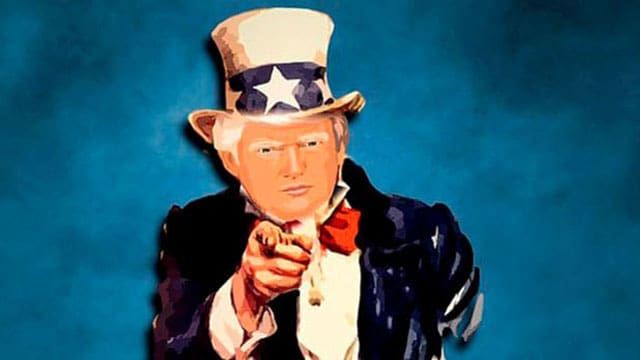Canada’s over-reliance on the U.S. has left us dangerously exposed to Trump’s threats

For interview requests, click here
Good news for all the Trudeau-haters: your “F-Trudeau” flags and banners don’t need to be retired when the much-maligned prime minister steps down later this year. With a small edit, they can find new life. Drop the “deau” and add “mp.” We have a new Public Enemy No. 1: Donald Trump, the psychopathic sentenced felon poised to reclaim the presidency of a diminished democracy.
These recycled slogans may come in handy as Canadians face an uncertain future. Trump’s ambition to reshape the world order – including his musings about annexing Canada into a “United States of North America” – is no joke. In December, during an interview on Meet the Press, Trump suggested Mexico could become the 51st state. If he gets his way, will Canada be next?
While Mexico’s President Claudia Sheinbaum responded swiftly and firmly, reaffirming her nation’s sovereignty, Canadian leaders have been comparatively subdued. Trudeau’s outgoing status weakens his words, while Alberta Premier Danielle Smith and Saskatchewan Premier Scott Moe have echoed Trump’s call for tighter borders, citing the need for stricter immigration policies. This alignment with Trump’s rhetoric raises concerns about a potential erosion of Canadian independence in the face of U.S. influence. Green Party Leader Elizabeth May, in contrast, lightened the mood by suggesting California, Oregon, and Washington should join Canada instead – a quip that highlights the absurdity of Trump’s annexation ambitions.
 Trump’s threats expose our vulnerabilities. |
| Recommended |
| Premiers clash over strategy as Trump tariffs threaten economy
|
| Trump’s tariff threats are more bark than bite
|
| Canada needs to become Trump proof, not Trump worthy
|
Trump’s grievances with Canada focus on border security and trade deficits. On border security, his claims that Canada leaks drugs and migrants into the U.S. are grossly misinformed. Most border issues stem from Mexico, and U.S. border enforcement is ultimately an American responsibility. Canada co-operates extensively with U.S. authorities to secure the border. Meanwhile, the flow of guns from the U.S. into Canada remains a far more devastating issue for Canadian communities.
On trade, Trump falsely claims the U.S. subsidizes Canada by more than $100 billion annually. In reality, Canada’s trade surplus with the U.S. is about $60 billion, driven largely by oil exports. Without oil, the U.S. runs a surplus on all other goods. Trump’s exaggerations may be typical of his rhetoric but gain traction when amplified by his supporters. If Trump imposes tariffs on Canadian oil, the impact would be catastrophic for Alberta’s economy while driving up U.S. gas prices – an outcome that would harm both countries.
Canada’s over-reliance on the U.S. has left us vulnerable. For decades, we’ve ceded control of critical industries, embraced American culture, and reduced military capabilities to fund social programs. This complacency has lulled us into a false sense of security, assuming the U.S. would always act as a benign partner. Trump’s presidency shatters that illusion. His crude, self-serving approach to international relations forces Canada to confront an uncomfortable truth: we must stand on our own. This means developing new markets for oil, building economic resilience, and strengthening our national identity.
Premier Smith has made it clear she opposes retaliatory measures such as cutting off energy exports to the U.S., emphasizing Alberta’s reliance on the American market for oil. Other Canadian leaders, like Ontario Premier Doug Ford, have floated the idea of targeting specific U.S. exports – Florida orange juice or American-made alcohol, for instance – in response to tariffs. But such measures would have little real impact.
The broader implications of Trump’s rhetoric are even more troubling. His disdain for multilateral agreements, human rights, and democratic norms stands in stark contrast to Canada’s values of compromise, inclusion, and peace. Canadians cannot afford to ignore the broader consequences of his agenda. What happens in Washington affects the world, but none more directly than their closest neighbour to the north.
The coming months will test Canada as never before. Trump’s threats are more than bluster; they are a challenge to our sovereignty and values. Retaliatory tariffs and economic strategies are a start, but they are not enough. Canada must reduce its dependence on the U.S. while strengthening alliances with nations that share our principles.
Canada is not merely a trading partner or quiet neighbour. We are a sovereign nation with unique values: compromise over conflict, curiosity about the world, and a commitment to peace and inclusion. These values are worth defending.
To the bully south of our border, we say this: Canada is not for sale. Push us, and you’ll find out just how fiercely we defend our independence. Our leaders must rise to this moment and prove we are a nation, not just in name but in spirit and resolve.
Doug Firby is an award-winning editorial writer with over four decades of experience working for newspapers, magazines and online publications in Ontario and western Canada. Previously, he served as Editorial Page Editor at the Calgary Herald.
Explore more on Donald Trump, Canada U.S. relations, Canadian economy
Troy Media is committed to empowering Canadian community news outlets by providing independent, insightful analysis and commentary. Our mission is to support local media in building an informed and engaged public by delivering reliable content that strengthens community connections, enriches national conversations, and helps Canadians learn from and understand each other better.
